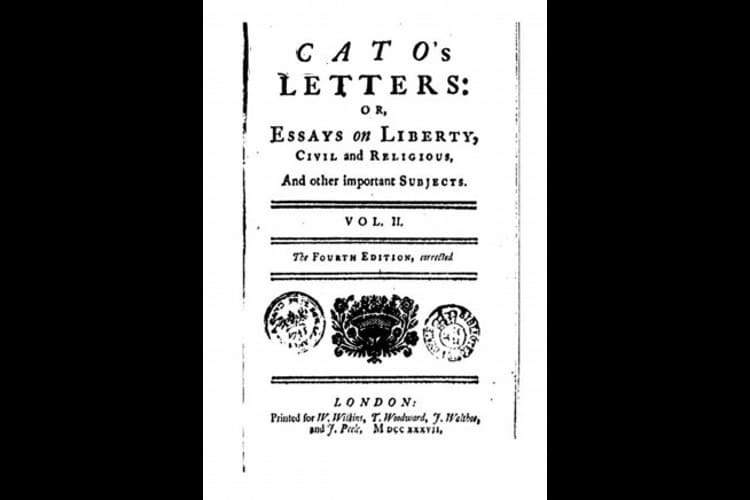
Three hundred years ago today, the final installment of Cato’s Letters was published in London. It was Number 138 and was one of the few of that collection co-authored by John Trenchard and Thomas Gordon.
For those of you unfamiliar with those names, I direct you to this article I wrote regarding their incalculable contribution to the founding of the United States. For the purposes of this article, I’ll copy a snippet of that article to give you a condensed version of the longer piece:
Written under the pseudonym “Cato” (in honor of the Roman hero and champion of liberty and republican virtue, Cato the Younger), Trenchard and Gordon wrote some 144 of these letters, ranging in topics from tyranny, to the dangers of a central bank, to the threat to liberty posed by political parties, to freedom of the press and speech, and everything in between. They are classics in the corpus of republican political philosophy.
Cato’s Letters were so popular to the Founding Generation that they were “quoted in every colonial newspaper from Boston to Savannah,” as reported by noted historian Elizabeth Cook.
In his book Seedtime of the Republic, Clinton Rossiter, Founding Era expert and prolific author of books and articles on the Constitution and the creation of the American union, wrote in abundant praise of Cato’s Letters:
“No one can spend any time in the newspapers, library inventories, and pamphlets of colonial America without realizing that Cato’s Letters rather than Locke’s Civil Government was the most popular, quotable, esteemed source of political ideas in the colonial period.”
The end of the Cato collaboration was hastened by John Trenchard’s sickness and subsequent death from what was described at the time as an “ulcer of the kidneys.” Gordon, Trenchard’s junior by greater than 30 years, carried on as the lone author of a few additional letters, but they were not widely read.
It is literally impossible to exaggerate the effect of Cato’s Letters on American colonists leading up to the War for Independence. As early as 1721 — just months after their original publication in The London Journal — several of the letters were published in the New-England Courant. Later, when the editor or that paper was imprisoned for criticizing British policies and the local leaders who enforced them, his younger brother, Benjamin Franklin, printed the installment of Cato’s Letters written in defense of freedom of the press.
Colonial newspaper The Massachusetts Spy reported being “busily parceling out almost every essay … and Cato I assure you, Sir, gives us a shocking image of despotism.”
That, after all, was the goal. Trenchard and Gordon intended to expose the tools used by tyrants to enslave the people by force and fraud. As they explained in their final letter:
As I think I have unanswerably shown that civil governments were instituted by men, and for the sake of men, and not for the pride and lust of governors; and consequently that men have a right to expect from them protection and liberty, and to oppose rapine and tyranny wherever they are exercised.
Just a quick glance at the table of contents of the collected volumes of the letters reveals that the prolific pair — sometimes called “Libertarian Loyalists” — never missed an opportunity to frankly and ferociously call out tyrants and their equally culpable courtiers: “I may reasonably hope that I have removed many of the prejudices imbibed by education and custom, and set many of my countrymen free from the wild, wicked, and servile notions, strongly infused and planted in their minds by craft and delusion.”
It was ultimately the design of these courageous men to put an end to “narrow notions of bigots, who will renounce any opinion as soon as it appears to be rational, and would rather make nonsense of it.” That mission was certainly accomplished, at least so far as our ancestors were concerned. These letters securely anchored their commitment to liberty on the English Constitution and on the principles upon which it was founded. The wit and wisdom supplied in every letter signed by “Cato” reminded their readers — including our Founding Fathers — that their was no liberty without virtue and no virtue without liberty.
Denouncing the evil of political factions was a primary goal of Cato’s Letters. Several of the weekly “Cato” contributions warned readers of the threat to liberty posed by political parties and those who support them. They write, in their final letter, that they wrote out of concern with:
the many mischiefs, which the leaders and deceivers of parties and factions did to the world, by throwing God’s judgments at one another, and impiously confining his providence and mercies to themselves; and by applying the common phenomena and events of nature to their own advantage, and interpreting the same as denunciations of his wrath against their enemies.
The topics addressed in Cato’s Letters are so appropriate to our day they sound like they could have been written yesterday, rather than 300 years ago. Consider their observation of the lamentable state of education in England, where rather than ennoble and enlarge the mind, schools tended to
contract and embitter the mind, to stifle and oppress the faculties, and to render men dupes and machines to the ambition, pride, and avarice of selfish and haughty ecclesiastics, or of corrupt statesmen.
Nor can I see how this great evil can ever be cured, till we change the education of our youth; and let gentlemen be bred by gentlemen, and not by monks and pedants; whom yet I would suffer to dream on with their bellies full of college-ale, and their heads full of college-distinctions; but think that they ought not to be trusted with the education of our [youth] till they have some themselves.
What contemporary observer of the education system in American wouldn’t agree with that 300-year-old assessment?
Recalling the “powerful societies and parties” that their letters provoked and the “nests of hornets” they disturbed, Trenchard and Gordon were satisfied with their defiance of the “resolve to brave the danger.”
It was, “Cato” wrote in his farewell missive, among his chiefest aims to declare boldly:
that those who rioted in power, and upon the public misfortune, would very unwillingly hear that they were trusted with that power for the public advantage, and not for their own; that they were obliged by all the motives of honor, virtue, and religion, to serve and protect the people out of whose industry and wealth they were so highly rewarded; and that they deserved the severest punishment if they did otherwise.
Having completed their mission, having finished the race set before them, John Trenchard and Thomas Gordon humbly, but honestly said goodbye to their readers, concluding, “I therefore here lay down this paper, and with it the most virtuous and noble subject that can employ the human soul; the subject of religion and government.”
Shop For Night Vision | See more…
Shop For Survival Gear | See more…
-
Sale!

Mesh Shooting Hunting Vest with Multi Pockets
Original price was: $59.99.$39.99Current price is: $39.99. Add to cart -
Sale!

Tactical Camo Nylon Body Armor Hunting Vest With Pouch
Original price was: $49.99.$39.99Current price is: $39.99. Select options This product has multiple variants. The options may be chosen on the product page



















































